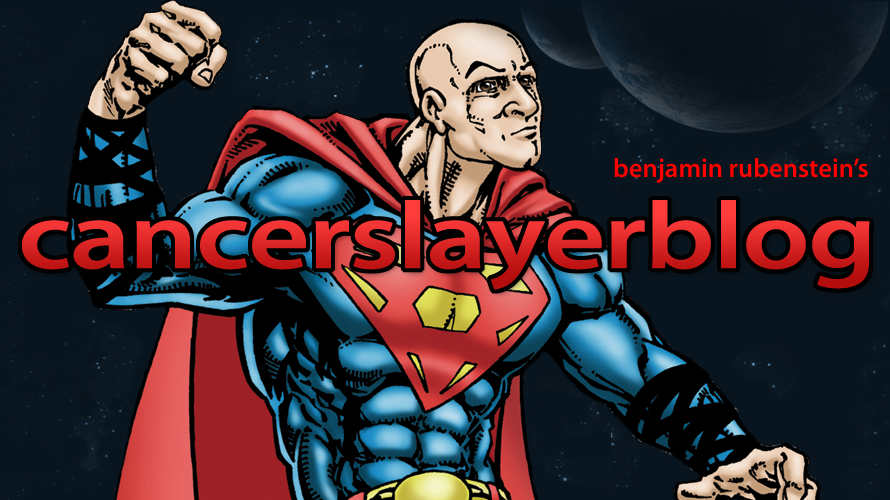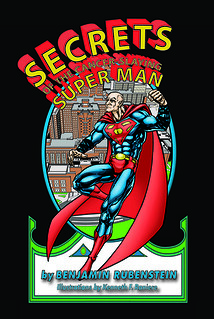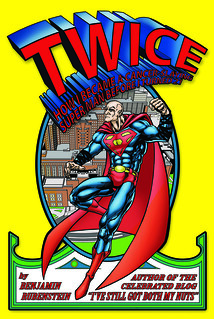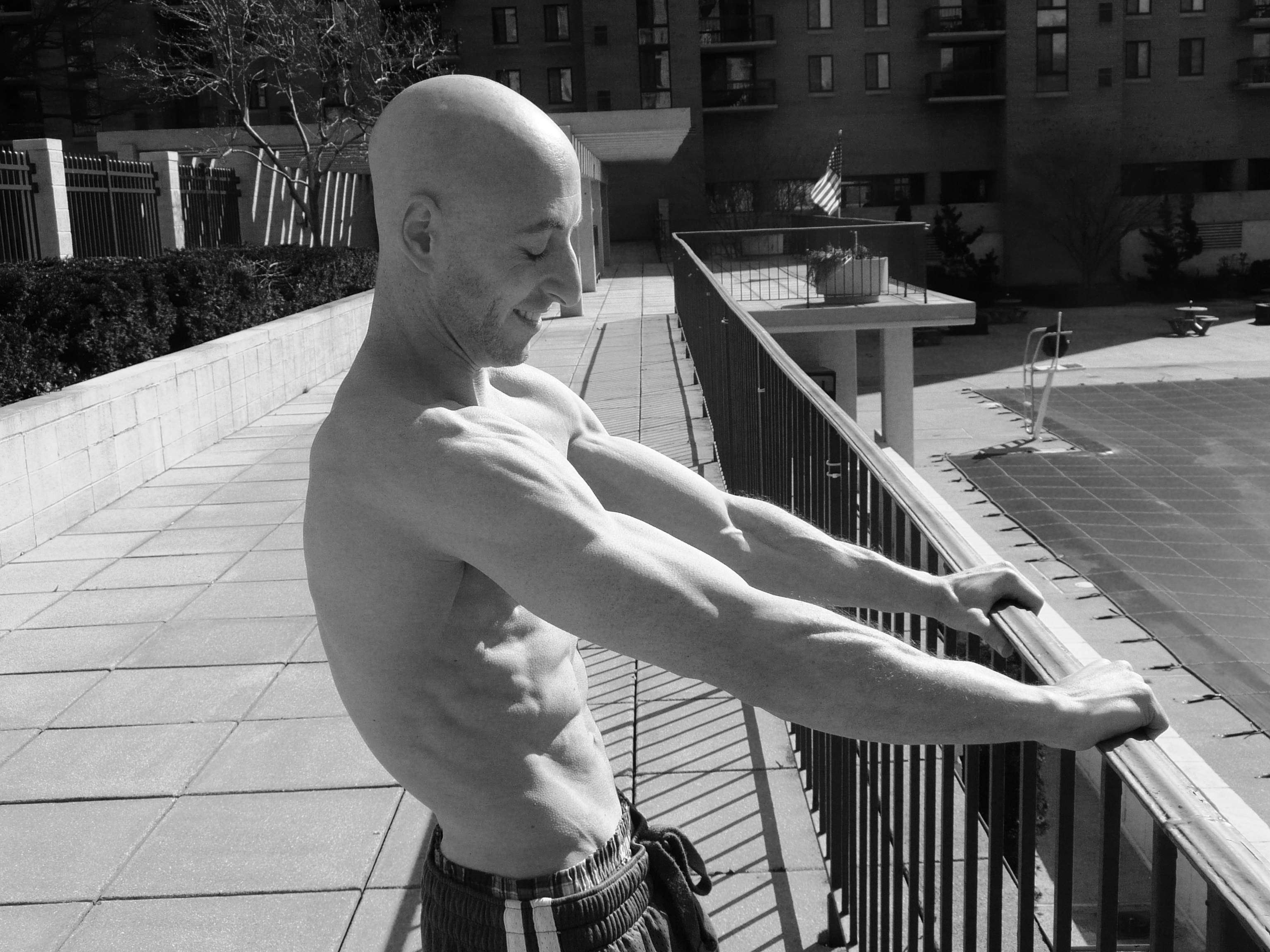Last night I spoke about TWICE at my Temple, Congregation Ner Shalom. My delivery from the bema wasn't Obama-esque, but I am determined to improve, as I will have more speaking opportunities to come. I am prepared to try anything: Toastmasters, acting classes, relaxation techniques, beta blockers, and of course benzodiazepines.
Here is a transcript of my speech:
Lightning flickered inside my hip. Every time my left shoe landed on the ground, another fiery explosion. The pain left just as quickly as it came, waiting for another flicker.
I was a sophomore in high school playing in a singles match to determine seeding for the tennis team. That was the first time I felt pain, and I pushed it aside because I wanted to play. But it would not be the last time. The pain continued and worsened over the coming half-year.
It turns out I had a rare form of bone cancer called Ewing’s sarcoma. They say this kind of thing can happen to anyone, but nobody really believes that until it does. So, I went through the whole process I’m sure you’ve heard far too many times already—official diagnosis, telling friends and family, and preparing for and beginning treatment.
Soon after treatment started was when I realized that I had superhuman powers. I know what you’re thinking—that superheroes like Brandon Routh, Christian Bale, and Christopher Reeve are taller and not nearly this good looking. True. But from the signs I was given, there was no other way for me to perceive it. My body recovered faster than the other patients, the treatment was more effective for me, and I generally tolerated everything easier. Chemo kills blood cells, but my bone marrow was more resilient than my nurses had ever seen.
So, however morally wrong it was, I looked down on the other patients and considered them inferior. I distanced myself from them—they were ill, I wasn’t. They were mere human beings, and I wasn’t.
Because of my powers, I didn’t fear death. I felt no reason to become any more religious than I had been before. I didn’t let cancer change me. I likened my illness to the way I rooted for my favorite professional wrestlers Dwayne “The Rock” Johnson and “The Heartbreak Kid” Shawn Michaels: in order to win the match, I had to fight the bad guy, even if that included the 500-pound Yokozuna, though hopefully my opponent wouldn’t give me The Bonzai Drop, Yokozuna’s patented maneuver. My opponent would punish me a little, but in the end I knew I’d win.
I created a set of rules that guided my life: don’t complain, don’t be sad or jealous, don’t be angry for having cancer, think of cancer as normal. I followed the rules to a T. When I saw the other patients whining and crying, I felt reinforced, and so my ego inflated.
After a year I completed treatment—14 cycles of chemo, 5 weeks of radiation, complete removal of my left hip. I was now cancer-free just as I knew I would be. I went on with my senior year of high school and first year of college like cancer didn’t affect me, expect that now instead of playing tennis, I clobbered friends in Tiger Woods PGA Tour 2003 on PlayStation 2.
The funny thing is that the same rules that helped me survive and even thrive during treatment held me back as a survivor. I was stuck in the past and stuck in a mindset that inhibited my growth. I sought out old friends from high school instead of making new ones. Cancer was a part of me, but bringing it up or telling people that I once had it was an act of complaining. Complaining was my number one sin, worse than any of the commandments or all of them combined.
I was lost, in a sense. But then, abruptly, I was diagnosed with a second, different cancer of the bone marrow called myelodysplasia. This was caused by the very treatment that killed my first cancer. My rules held strong, and were there once again when I needed them, just like Superman bursting through the atmosphere to feel the sun’s radiant energy. Instead of fearing death like most people would normally do in this instance, I stayed focused on getting treatment and surviving.
Whatever qualms one might have about inhibiting my own personal growth in college were completely and entirely outmatched by knowing that I was superhuman. I knew that my powers would lead me to a degree from University of Virginia and beyond, despite receiving a 50/50 chance at living past 20.
But this time, I wasn’t superhuman at all. I received an umbilical cord stem cell transplant at the University of Minnesota, and the treatment beat me up. I developed bacterial, viral, and fungal infections, as well as problems I didn’t know were possible. I was a mere mortal, now struggling to survive, instead of breezing to the finish line. My faith in my superpowers were shaken and nearly lost. But my faith hung by a thread, and though you may not see it, my invisible cape is still tied around my neck. I prevailed against my second adolescent cancer.
Am I now, or was I ever, a Super Man? I’ll leave that for you to decide. Do we all have the capacity for extraordinary things? Maybe so.
And now I leave off with a book excerpt. Even though I did not find religion the same way many newly diagnosed do, I did use Judaism in my own way. Jewish themes are prevalent throughout my book, and here is one instance. In this scene, I am about to receive my transplant via an IV catheter.
In late morning, Jen brought in a pathetically small bag of red liquid with a large O+ sticker on the front. Six months later my blood type would change from A+ to O+, that of my donor. I did a double take. This little thing is supposed to save my life? My unrelated umbilical cord was a 4/6 HLA match from an infant girl born in New York in 1999. That was all I knew of her. With God on my side, I was ready for that baby girl to rescue me.
Before Jen released the valve to allow the stem cells to flow through my veins, she asked, “Is there anything you would like to say first?”
I longed to say the Shema—a Jewish prayer declaring one’s faith in God—but instead said, “Do your job, little fella.” My No Complaining rule prohibited me from making a big deal out of it. It was no joke, and I knew that. Jen released the valve and the stem cells swarmed into my catheter.
While the little girl’s stem cells flooded my body, I closed my eyes and drifted into a fantasy. My strong heart pumped my future marrow through my bloodstream. The cells targeted my hip, sternum and skull. They latched on like spiders, and began to repopulate my empty calcium-phosphorus shells. It was glorious.
Now, there was only one thing left to do—pray that this girl, whom I would never meet and whose name I’ll never know, had the right kind of cells to give me a third chance at life.
Keep reading:
The Great Orator: Part II








2 comments:
I read your book, Ben. And I'm not trying to be overly dramatic here, but it gave me an understanding of what cancer patients go through that I never would have had... On top of that, you're a good writer. I read your book in about 2 days and it was great. Your success is well deserved,
Worm's brother, Jon
Big Worm,
I'm not trying to be underly dramatic here, but that's awesome to hear that you liked it, and thanks for sharing. Just wait until I write my next book about growing up a Redskins fan, and you'll get a full understanding of that struggle, too.
Post a Comment